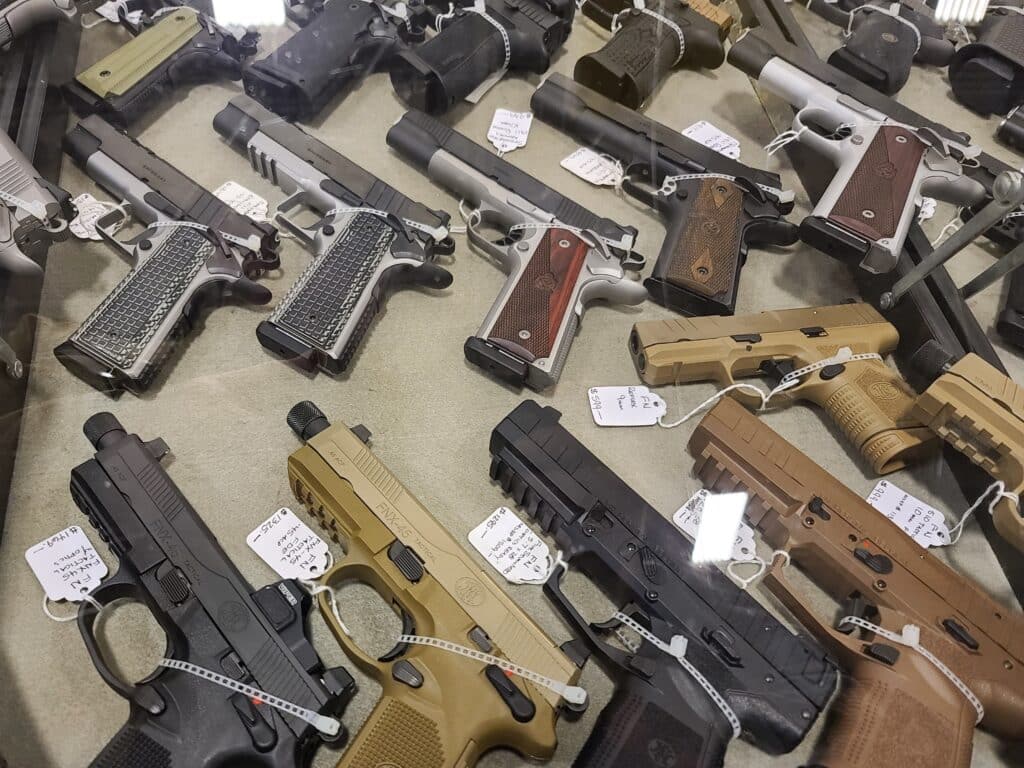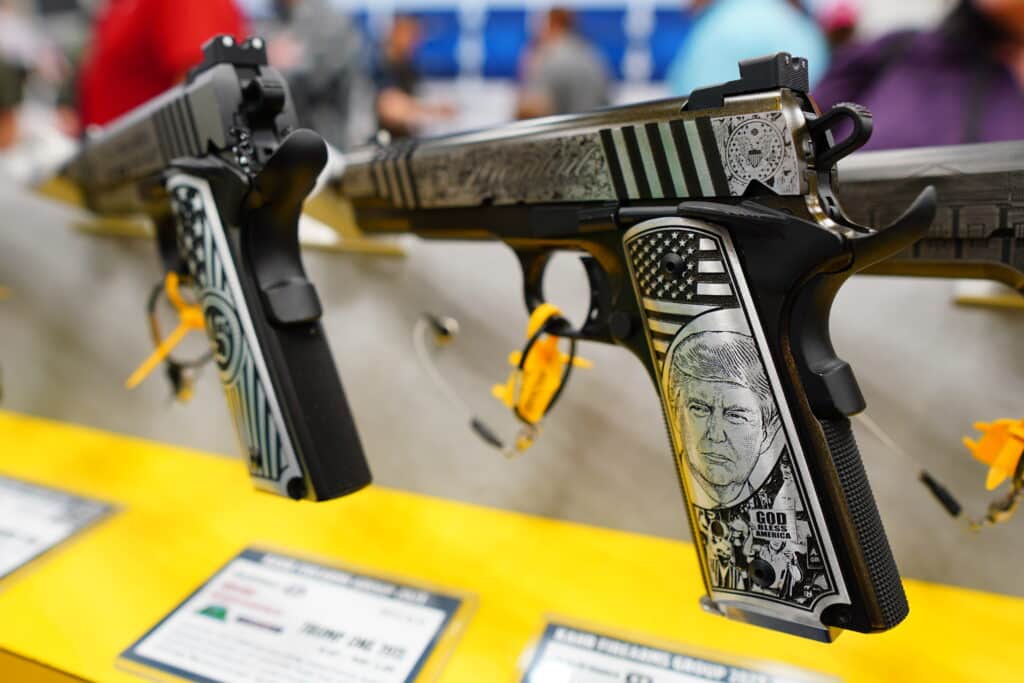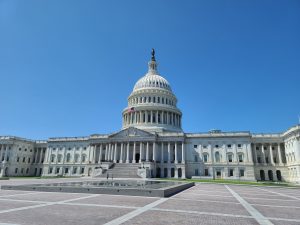We’re diving into the fight over what specific era of history applies when judges analyze gun laws under the Supreme Court’s Bruen standard. This time it relates to age-based gun restrictions. An appeals court struck down Pennsylvania’s effective ban on 18-to-20-year-olds carrying guns during a declared emergency.
As Contributing Writer Jake Fogleman explains, the court did so because it limited its inquiry to right around the Founding Era. But other courts have come to the opposite conclusion by expanding their search to include mid-to-late 19th-century regulations as well. Which side the Supreme Court ultimately comes down on will ultimately determine the breadth of gun rights for adults under 21.
The other fight we’ve focused on is the non-existent one surrounding gun policy in the Republican Presidential Primary. Frontrunner Donald Trump has a record he can run on, but one that also has a number of vulnerabilities from the right. At least one of his opponents built up a track record that seemed tailored to contrast well against Trump.
But, with the primary potentially coming to an early end if Trump wins decisively in New Hampshire, nobody has made his gun record an issue. It’s rather inexplicable.
Plus, author Mark W. Smith joins the podcast to discuss a surprising legal maneuver in the case against Maryland’s AR-15 ban.

Analysis: Judges Split on Historical Basis for Age-Based Gun Bans [Member Exclusive]
By Jake Fogleman
Are age-based restrictions on gun rights for young adults constitutional? Or are they incompatible with the right of the people to keep and bear arms? The answer, it seems, depends on your view of history.
A three-judge panel for the Third Circuit Court of Appeals contributed to the recent trend of federal courts casting doubt on gun restrictions for adults under 21 on Thursday. It struck down a Pennsylvania law prohibiting that group from carrying firearms during emergency declarations.
“Through the combined operation of three statutes, the Commonwealth of Pennsylvania effectively bans 18-to-20- year-olds from carrying firearms outside their homes during a state of emergency,” Judge Kent A. Jordan wrote in Lara v. Comm’r Pa. State Police. “The words ‘the people’ in the Second Amendment presumptively encompass all adult Americans, including 18- to-20-year-olds, and we are aware of no founding-era law that supports disarming people in that age group.”
Some courts had already cast a skeptical eye toward age-based gun restrictions even before the Supreme Court’s 2022 New York State Rifle & Pistol Association v. Bruen decision. In 2021, a Fourth Circuit panel ruled against the federal under-21 handgun sales ban. Then a Ninth Circuit panel struck down California’s under-21 semi-automatic rifle sales ban in early 2022. But such rulings have only accelerated since the High Court handed down its history-based test for Second Amendment cases.
In addition to the Third Circuit, federal judges in Texas, Tennessee, and Minnesota have all ruled against carry restrictions for 18-20-year-olds using the Bruen analysis. Meanwhile, federal judges in Virginia, Colorado, and West Virginia have all done the same for gun sales restrictions on the same age range.
However, the federal judiciary hasn’t been unanimous on the question. A federal judge out of Louisiana ruled to uphold the federal handgun sales ban to adults younger than 21 in December 2022. In March of last year, a three-judge panel for the Eleventh Circuit upheld Florida’s ban on gun sales for adults under the age of 21 in a since-vacated opinion. Meanwhile, a California federal judge last month upheld California’s semi-automatic rifle sales ban for 18-20-year-olds in a rehearing of the same case the Ninth Circuit ruled on pre-Bruen.
The central distinction differentiating the rulings has been the historical timeframe deemed relevant by the judges in each case.
Those that have limited their historical inquiry or otherwise given greater weight to historical laws at or near the Founding have tended to strike down young adult gun restrictions. That’s because not only is there a dearth of many true Founding-era gun laws tailored toward 18-20-year-olds, but those that did exist tended to support the idea of at least certain members of that age group being armed.
“Against that conspicuously sparse record of state regulations on 18-to-20-year-olds at the time of the Second Amendment’s ratification, we can juxtapose the Second Militia Act, passed by Congress on May 8, 1792, a mere five months after the Second Amendment was ratified on December 15, 1791,” Judge Jordan wrote. “The Act required all able-bodied men to enroll in the militia and to arm themselves upon turning 18. That young adults had to serve in the militia indicates that founding-era lawmakers believed those youth could, and indeed should, keep and bear arms.”
On the other hand, judges that have emphasized more recent history surrounding the time of the Fourteenth Amendment’s ratification in 1868 have almost unanimously found age-based gun restrictions constitutional. Indeed, a review of historical firearms laws reveals a plethora of state-based restrictions on the sale or carrying of certain weapons to persons under the age of 21 beginning in the 1870s.
“Between the Fourteenth Amendment’s ratification and the close of the nineteenth century, at least sixteen states and the District of Columbia joined Alabama, Kentucky, and Tennessee—a total of at least twenty jurisdictions—in banning sales of firearms to 18-to-20-year-olds,” Eleventh Circuit Judge Robin Rosenbaum wrote in NRA v. Bondi. “It’s clear that the public understanding of the Second Amendment at the time of the Fourteenth Amendment’s ratification—as demonstrated by the wealth of Fourteenth Amendment-Ratification Era analogues for Florida’s law—permitted the states to limit the sale of firearms to those 21 and older.”
Judges and legal advocates who support an emphasis on history limited at or near the Second Amendment’s ratification in 1791 argue that the amendment’s public meaning should be fixed according to how it was understood by those who adopted it. They contend that laws passed contemporaneously provide the best context for how the Founding-era understood the Second Amendment’s limits.
By contrast, judges and advocates on the other side of the question argue that the era surrounding the Fourteenth Amendment’s ratification provides important context because that amendment supplied the legal vehicle for incorporating the Second Amendment’s protections to the states. Therefore, they argue, laws passed by the same governments that ratified the Fourteenth Amendment should be given equal weight to Founding-era laws for informing the public understanding of gun rights protections.
The Supreme Court, in its Bruen opinion, left some degree of ambiguity as to whether laws dating near the Fourteenth Amendment’s ratification should be given near equal weight to those at the time of the Founding.
“We have made clear that individual rights enumerated in the Bill of Rights and made applicable against the States through the Fourteenth Amendment have the same scope as against the Federal Government,” Justice Clarence Thomas wrote. “And we have generally assumed that the scope of the protection applicable to the Federal Government and States is pegged to the public understanding of the right when the Bill of Rights was adopted in 1791.”
“We also acknowledge that there is an ongoing scholarly debate on whether courts should primarily rely on the prevailing understanding of an individual right when the Fourteenth Amendment was ratified in 1868 when defining its scope,” he added. “We need not address this issue today because, as we explain below, the public understanding of the right to keep and bear arms in both 1791 and 1868 was, for all relevant purposes, the same with respect to public carry.”
Expect to see lower courts continue to diverge on this very question over age-based gun restrictions until that ambiguity is resolved.
Podcast: Mark W. Smith on the Game Being Played With the Maryland AR-15 Ban Case [Member Early Access]
By Stephen Gutowski
This week, we are discussing a number of legal developments. So, we’ve got one of the preeminent pro-gun legal minds on the show.
Mark W. Smith, host of the Four Boxes Diner and member of the Supreme Court bar, joins me to talk about some complicated but fascinating cases. First and foremost, Smith explains why the case against Maryland’s “assault weapons” ban has been moved on to be heard before the full Fourth Circuit Court of Appeals without the lower court panel that already held arguments issuing any decision. Smith predicted that might happen.
He said it was done to try and delay the case further. He argued the intent was to keep the Supreme Court from getting ahold of the case and potentially overturning the ban. Smith said that tactic was becoming more common among liberal-leaning courts in the wake of the Supreme Court’s landmark Bruen decision.
But he also explained the Court may take up an AR ban case sooner than later anyway. He said it doesn’t even necessarily need a circuit split, which is unlikely to happen anytime soon, to weigh in on the case.
Smith also weighed in on the Department of Justice’s surprising brief in the NRA’s First Amendment case at the Supreme Court. Plus, Contributing Writer Jake Fogleman and I talk about how a board member’s letter brought the NRA’s internal turmoil back out into the open.
You can listen to the show on your favorite podcasting app or by clicking here. Video of the episode is available on our YouTube channel. Reload Members get access on Sunday, as always. The show goes public on Monday.

Analysis: Gun Policy Remains Inexplicably Absent from Republican Primary Race [Member Exclusive]
By Stephen Gutowski
Former President Donald Trump won the Iowa caucus on Monday. And he did it without having to defend his record on gun policy because none of his opponents have made it an issue in the race.
His remaining opponents, former South Carolina Governor Nikki Haley and Florida Governor Ron DeSantis, have done little to try and draw a contrast with Trump on guns. They’ve spent much time going after each other rather than the frontrunner. But, even in criticizing each other, they’ve avoided the topic of firearms.
That’s perhaps a symptom of a larger issue with the campaigns Trump’s opponents have run. Their often tacit or explicit endorsement of the idea that Trump won the last election and all of his legal problems are illegitimate witch hunts has severely undermined the viability of their own candidacies. After all, if Trump really won the last election and he hasn’t committed any crimes, why shouldn’t Republican primary voters just pick him again?
To be fair, DeSantis and Haley have been more willing to criticize his policy record on some fronts, such as his handling of the Coronavirus pandemic. Yet that willingness often hasn’t extended to how Trump has handled gun policy.
That’s very odd given, as we’ve noted before, DeSantis appeared to be setting himself up to run to Trump’s right on the issue. In 2022, he signed new rules banning banks from dropping Florida gun companies and eliminated permitting requirements for concealed carry. That gave him a favorable record to contrast against Trump.
After all, Trump’s record on gun policy is more mixed than most Republican voters probably realize at this point.
He certainly has a number of pro-gun accomplishments and has been vocally pro-gun at points. He signed a repeal of Obama-era regulations, barring some Social Security recipients with mental health issues from buying guns. He added gun companies to the list of essential businesses during the pandemic. And, of course, he appointed three of the six Supreme Court justices who ruled the Second Amendment guarantees an individual right to carry a gun in 2022’s New York State Rifle and Pistol Association v. Bruen.
He’s also repeatedly promised to defend the Second Amendment in public speeches. Those speeches include the keynotes at every NRA Annual Meeting since 2017–when he became the first sitting President since Ronald Reagan to address the gun-rights group.
However, he has a number of vulnerabilities as well. Before he ran for office, he wrote a book called “The America We Deserve” that featured support for an “assault weapons” ban. In the wake of the El Paso shooting, he reportedly had to be talked out of supporting a ban on AR-15s and other firearms. Similarly, in the wake of the 2017 Parkland shooting, he held a roundtable discussion with a bipartisan group of Senators where he said, “…take the guns first, go through due process second” when discussing the potential to pass a so-called red flag law.
During that meeting, Trump’s Vice President Mike Pence said such measures can “give families and give local law enforcement additional tools if an individual is reported to be a potential danger to themselves or others.”
“Allow due process so no one’s rights are trampled,” Pence said. “The ability to go to court, obtain an order, and then collect not only the firearms but any weapons in the possession of that individual…”
“Or, Mike, take the firearms first and then go to court,” Trump interrupted. “Because, a lot of times, by the time you go to court, it takes so long to go to court, to get the due process procedures—I like taking the guns early. Like in this crazy man’s case, that just took place in Florida, he had a lot of firearms, they saw everything—to go to court would have taken a long time, so you could do exactly what you’re saying, but take the guns first, go through due process second.”
His support for working with Democrats to enact new gun restrictions didn’t survive the announcement of his first impeachment. However, Trump’s first term did see a significant new gun regulation. In the aftermath of the Las Vegas shooting, he used ATF rulemaking to unilaterally impose a ban and confiscation scheme on bump stocks. That policy has since been found unconstitutional in federal court and has been copied repeatedly by President Joe Biden to institute bans on unfinished gun parts and pistol braces.
At the beginning of the campaign, Trump doubled down on his support for the ban.
“As you know, the bump stocks are actually a very unimportant thing,” Trump said during a CNN town hall in May 2023. “NRA I went with them, and they said, ‘it doesn’t mean anything, or actually all they do is teach you how to shoot very inaccurately.’ So, we did that.”
The DeSantis camp has taken occasional shots at Trump’s gun record. When asked directly about Trump’s remarks a few days later by conservative radio host Dana Loesch, DeSantis criticized the bump stock ban.
“That’s unconstitutional,” DeSantis said. “It violates the Second Amendment, but I think, even more important, it violates the Fifth Amendment because they can’t take anything from you without due process. It’s not just firearms. And, so, the idea that you’re seizing people’s property and then promising due process later; that is wrong. That’s not something I would support.”
The Super Pac backing him also produced an ad hitting Trump on many of the issues mentioned above.
“Trump promised NRA members he’d have their back,” the ad begins. “When Second Amendment rights came under attack, Trump abandoned us and stood with liberal Democrats.”
But, as far as I can tell, the group has only ever tweeted it out. Once in April and once just before the Iowa Caucus.
But that’s about the extent of criticism levied at Trump over guns. Even when prompted about the issue in the first primary debate, nobody even mentioned Trump.
Trump has also increasingly engaged in the kind of rhetoric that gun-rights activists have traditionally found concerning. He’s promised to “root out” his political opponents who live like “vermin” and accused illegal immigrants of “poisoning the blood of our country.” He’s continued to praise the strength of dictators like Kim Jong Un and Xi Jinping while rebuffing an attempt by Sean Hannity to get him to say he won’t be a dictator himself.
“We love this guy,” Trump said of Hannity during a town hall. “He says, ‘You’re not going to be a dictator, are you?’ I said: ‘No, no, no, other than day one. We’re closing the border, and we’re drilling, drilling, drilling. After that, I’m not a dictator.’”
That sort of rhetoric is part of what led to a new endorsement for Nikki Haley in the lead-up to the New Hampshire primary, which could well be the last chance for a Trump challenger to change the trajectory of the race. A gun-rights group, albeit a small one, has waded into the Republican primary in favor of Haley and against Trump. This week, the Independent Firearm Owners Association (IFOA) came out in favor of the former governor.
“Trump has stated he intends to be an absolute dictator on day one of his administration. Just one day, one is one too many!” Richard Feldman, a former NRA lobbyist and president of the group, said. “His unprincipled ‘Art of the Deal’ mentality and his oft-demonstrated lust for unrestrained personal power means that no Trump commitment to any position can be trusted. In simple terms, we have no confidence in Trump’s pledge to uphold and protect the gun rights of law-abiding citizens.”
But Haley hasn’t even touted that endorsement. Her campaign didn’t respond to a request for comment on it. So, it’s not entirely clear she wants to take on Trump in this way regardless of what IFOA does.
The window is probably closing for Trump’s Republican opponents to focus their fire on his vulnerabilities in this area. If he wins the New Hampshire primary, the path to beating him becomes even less clear than it already is. But there’s little sign either DeSantis or Haley plans to change course now.
That’s it for now.
I’ll talk to you all again soon.
Thanks,
Stephen Gutowski
Founder
The Reload







